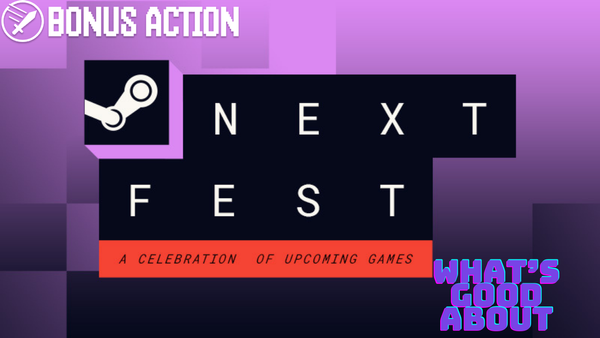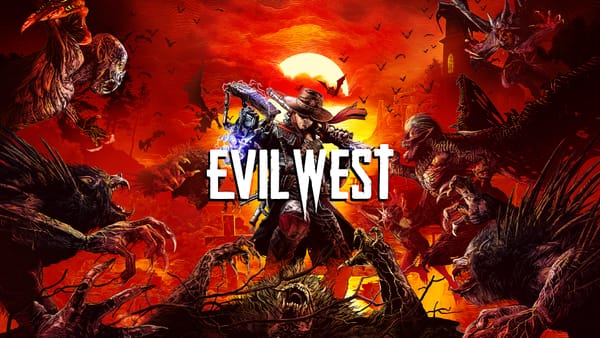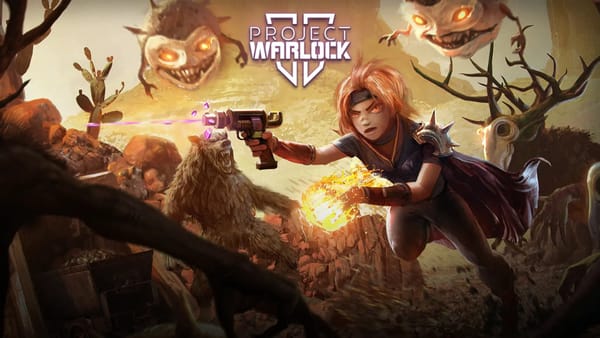What’s Good About: Hades
A hellish good time!
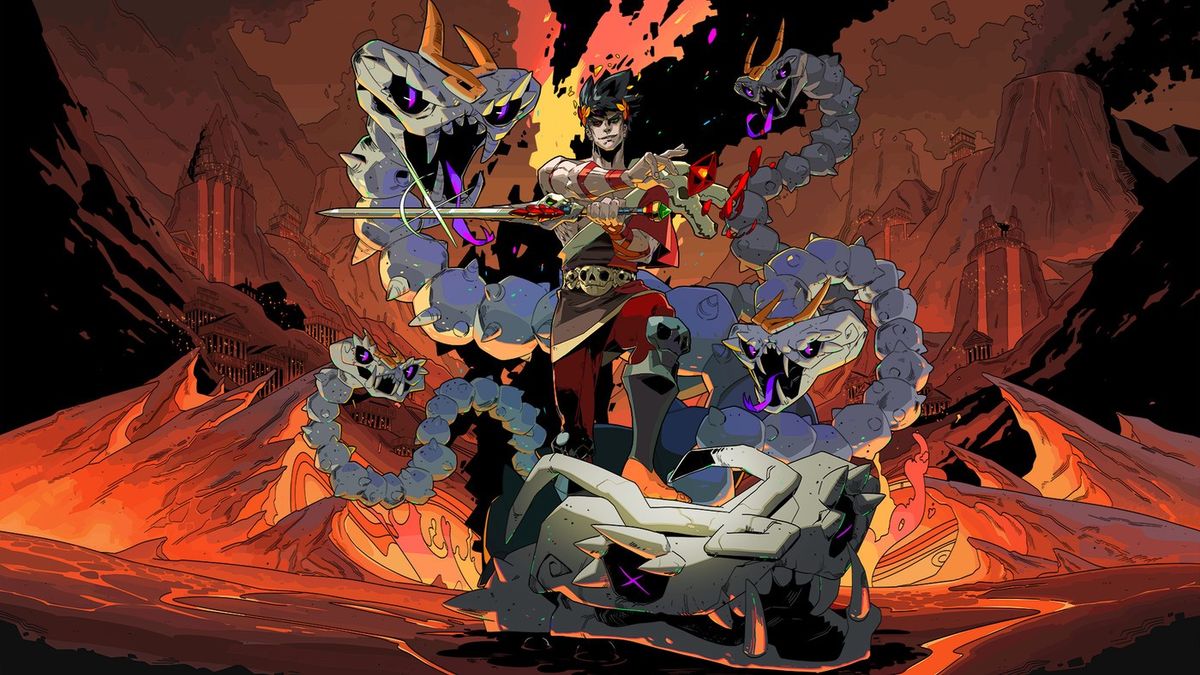
(Editor’s Note: There is passing mention of the game’s Early Access Development and the complications it went through as a result of the COVID-19 Pandemic. If you want to learn more about either, I highly recommend the Docuseries “Hades: Developing Hell” by Noclip on YouTube, it’s Excellent. Back to the regularly scheduled chicanery)
10 months, over 100 escape attempts. That’s how long it took for me to get my first clear in Hades. My heart was racing by the end of the final fight. For those who have been somehow living under a rock for almost two years, Hades is the new game from Supergiant Games that was finally released from Early Access last month. Now, if you’ve read my Games of 2019 post last year, you’d be correct in noticing that Hades was on there. To which I follow up by saying “Full Game’s Out now and I’ve been playing a ton of it. Of course, I’m gonna talk about it.”
For a quick recap, Hades was released onto Early Access via the Epic Games Store the night of its reveal/announcement during the 2018 Game Awards, followed by a Release onto Steam Early Access in 2019, and finally, a full 1.0 and Nintendo Switch release. Now if you think this is a lot for a smaller independent studio to commit to during the Open nature of the Earl Access development process; as well as the later stages of said development being completed remotely during the COVID-19 pandemic, you’d be correct. However, these don’t detract from the fact that Hades is both my current favourite game made by Supergiant and my favourite game of 2020 not named Doom Eternal.
The main conceit of Hades is that you play as Zagreus, prince of the Underworld and son of the titular God of the Dead (who’s wonderfully and grumpily voiced by Logan Cunningham in probably his best performance to date). For reasons that aren’t initially explained (and still won’t be here because of spoilers), Zagreus decides to escape from the Underworld to find answers about his family. The story, while not as much of an emotional gut-punch as Transistor and Pyre, still proves to be an entertaining story about family and how far you are willing to go to maintain and even repair those relationships. The characters in this yarn encompass various individuals from Greek Myths; ranging from the obvious, like the majority of the Olympians on display, to the less-known players like Zagreus himself and Primordial Chaos, the originator of all existence and Non-Binary Icon.
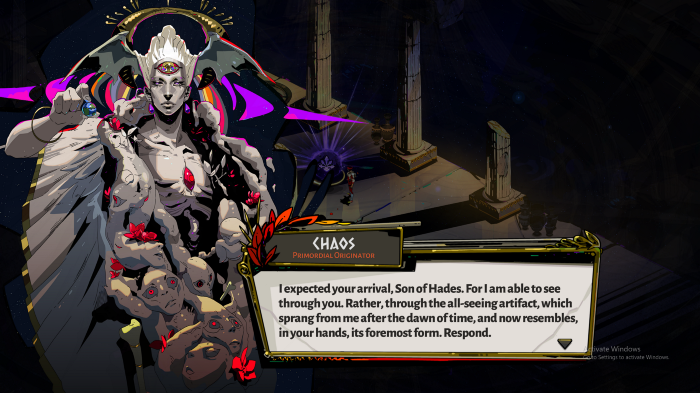
This is all well and good, but onto the actual game. Hades is a Roguelike Action RPG in which all of your runs, be they successes or (more often than not) failures are framed as Zag’s various escape attempts to get to the surface. You start in the pits of Tartarus and from there you go to the flaming rivers of Asphodel, the Fields of Elysium, and finally the Temple of Styx near the surface. All Chambers leading up to each area’s final boss encounter are procedurally generated with special events with characters residing in the underworld and shops run by Charon sprinkled in. The Randomization is justified by way of Daedalus being commissioned by Lord Hades to renovate the underworld sections beyond Tartarus; with Tartarus itself shifting around to keep prisoners from escaping. I love how this worldbuilding is used to explain mechanics is treated as being a part of how the underworld works and all of the characters treat it as such.
This extended to a lot of other mechanics as well, the most obvious being the various weapons and powers you get while on runs being boons and blessings the Gods and Chaos give you. 10 Boon types can all change your approach to runs; Athena is focused on reflecting attacks and damage resistances, Ares is focused on Damage buffs and a delayed damage curse called Doom, Aphrodite weakens enemies to reduce their damage (makes them weak in the knees, I see what they did there), Dionysus grants poisons with booze and affects health regeneration, Poseidon knocks enemies back with waves, Hermes focuses on making you go really fast, I don't need to explain what Zeus does, and Demeter is interestingly enough framed in the context of a Winter Goddess, giving you the power to slow/freeze enemies solid and even shatter them. Chaos is the odd god out, focusing more so on adding a Risk/Reward dynamic to runs by giving you a debuff that actively makes the next few combat encounters more dangerous (lose health by attacking, more enemies fought, reduced dash distance, etc.) in exchange for making another part of your kit more much powerful for the rest of the run. All of these combine and interact with each other in incredibly interesting and powerful ways, make for some cool builds, and can be combined to create duo boons: powerful buffs that highlight your strengths. My favourite is Merciful End, which makes it so that your abilities that deflect enemy attacks immediately activate Ares’s Doom Cruse. It’s pretty awesome.
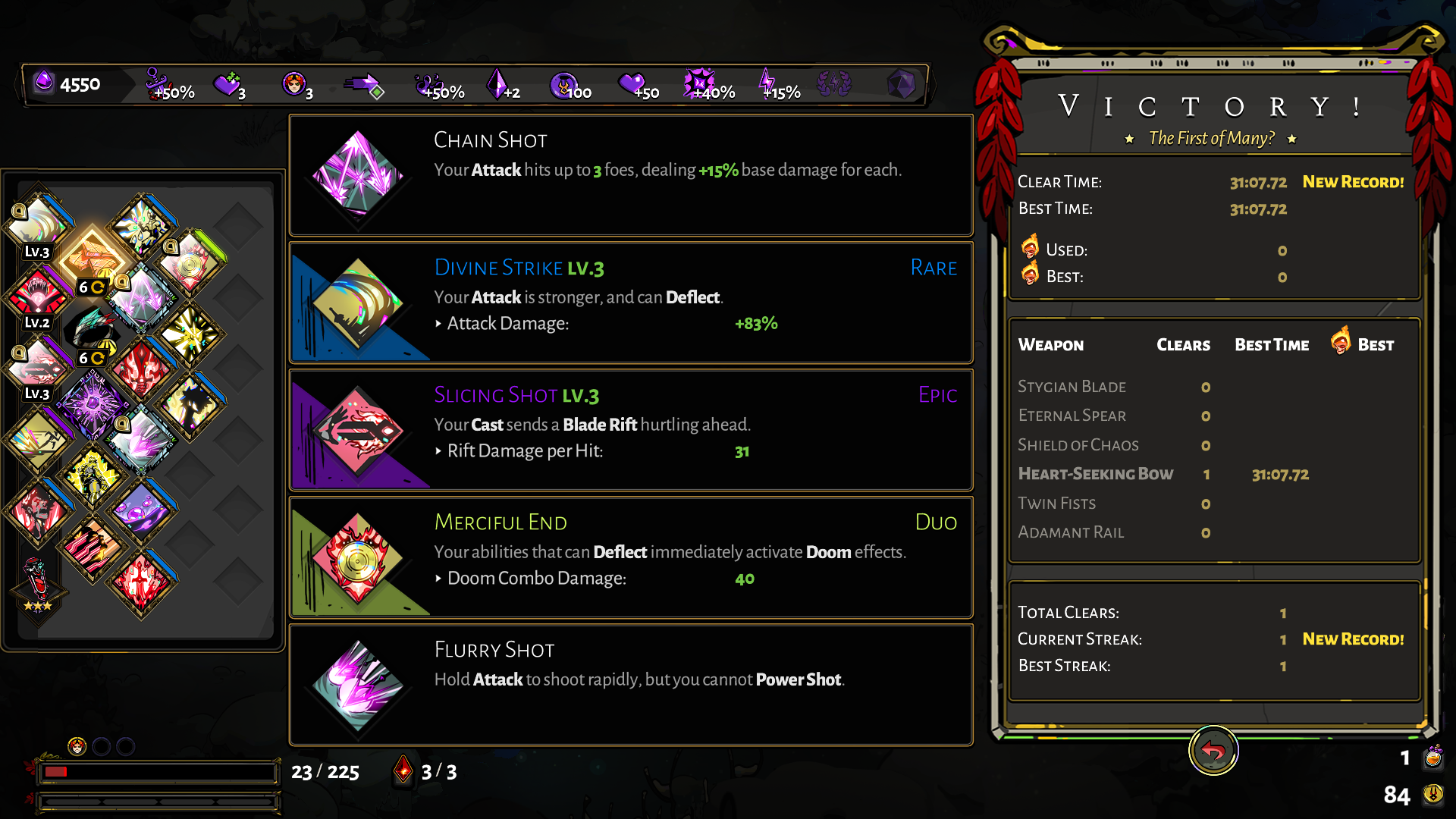
There are also the Infernal Arms, weapons used by the Olympians to slay the Titans and your primary tools for aiding in your escape. You initially start with just the Stygian Blade, but as time goes on you gain access to others including Varatha the Eternal Spear, Aegis the Shield of Chaos (you can throw it Captain America style), Coronacht the Heart-Seeking Bow, The Twin Fists of Malphon and Exagryph the Adamant Rail (Basically a Railgun). All can be upgraded and augmented to suit your playstyle. My go-to’s are the Spear with the Hades Aspect (Ironic, I know) which adds the Punishing Sweep debuff (enemies hit with the spear’s fully charged spin attack take increased damage), and the Hera aspect of the Bow, which loads your Cast Projectile into your next attack, which causes it to explode and use its effect on impact. These with Boons all add up to make you feel incredibly powerful; to the point where even if a build is less than optimal, you can still make it through a run and not feel like you got shafted by bad RNG.
The game also has all of the upgrades and progressions systems of a Roguelike. The main twists are reserved for after the first successful escape attempt: the continuation of the game’s story and the Pact of Punishment. The Pact is a bounty system that augments each run to make it more challenging in exchange for better rewards. These range from standard things, like enemies dealing more damage or you having less health per rank, to more…drastic measures, like bosses gaining new abilities or making it so that you only have a set time limit to escape each section of the underworld. It’s a flexible system that goes a long way to keep things from going stale.
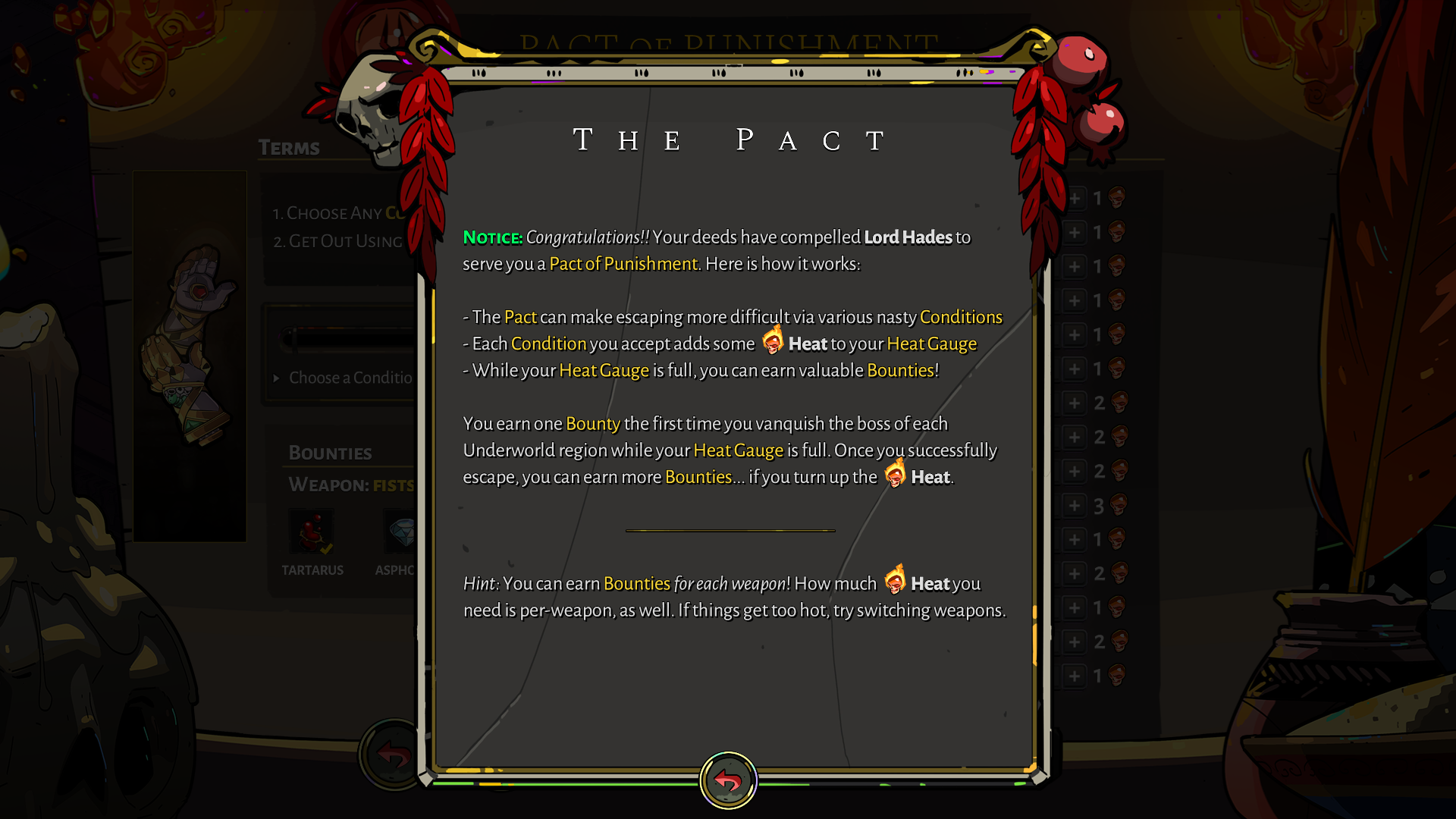
Lastly, I want to talk about art and music. They continue to be up to Supergiant’s standard, which is to say they are incredible. A thing I’ve noticed about the art and character designs when I was talking about them to a friend is that it has a surprising Hindi influence on a lot of the architecture and aesthetics across the board, which is apt when you consider the fact that the Greeks were a seafaring society. Supergiant is also to be commended for, and I quote myself here, “Creating the most bangable interpretation of the Greek Pantheon to date. And that is saying something.” The sole exception is Chaos, who looks more like a final boss in a Final Fantasy game. Unless you’re into that sort of thing, I won’t judge.
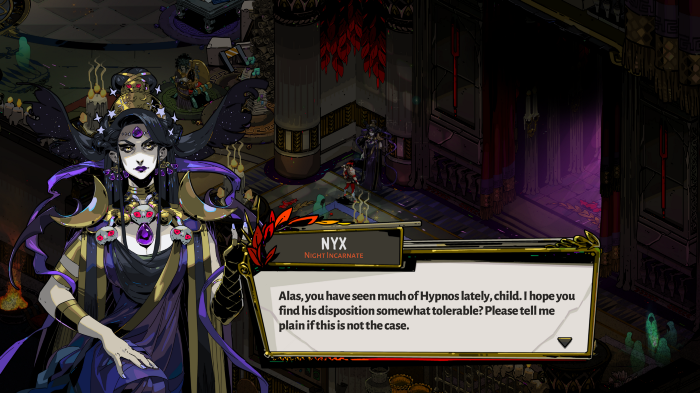
And what can I say about the music? It is once again done by Darren Korb, so you can already correctly assume a baseline of quality. But because Hades is inherently much more action-oriented than Supergiant’s past work, it proves that Mr Korb can, in fact, go fucking hard as the kids say (pardon the French). Each track when on runs has a slower, more low-key “background” version that kicks into high gear once the action starts. It’s a trick that, while already established by Patron Saint of Going Hard Mick Gordan, is still one of my favourite tricks that game music can use to express moods in an environment. The tracks used in boss fights in particular go hard and never stop. Special Shoutouts to “The Painful Way”, “The Exalted”, and “God of the Dead” in particular for reminding me that even though I’ve been a fan of his for over a decade at this point, D-Korb can still surprise me. Hell, the soundtrack is so good I’m listening to it right now as I write this!
At the end of the day, what Supergiant has created has quickly become my favorite game of theirs to date. It shows that Early Access can be done in a way that feels open and honest, and as a result, has made a game that can only be achieved through such a method. Their usual blend of strong art direction, storytelling, and gameplay is bolstered by a style that is so thoroughly outside of their wheelhouse that it loops back around to being something that you’re amazed they hadn’t done sooner. If you’re a fan of Supergiant, this is an easy sell. But if you like Roguelikes: I STRONGLY recommend taking a trip to the Underworld for one of the best gaming experiences of 2020.
All Screenshots are Provided by Yours Truly!


